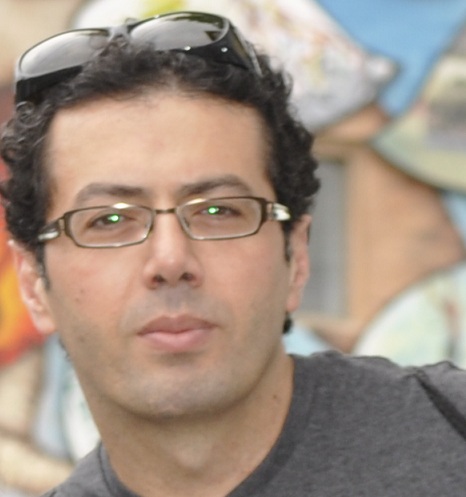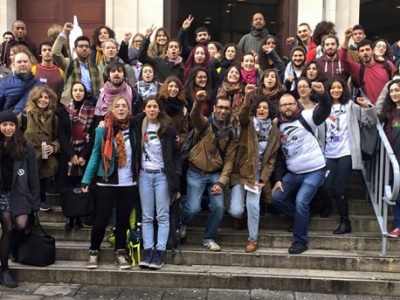www.aljazeerah.info
Opinion Editorials, December, 2016
Archives
Mission & Name
Conflict Terminology
Editorials
Gaza Holocaust
Gulf War
Isdood
Islam
News
News Photos
Opinion Editorials
US Foreign Policy (Dr. El-Najjar's Articles)
www.aljazeerah.info
|
Less Symbolism, More Action: Towards Meaningful Solidarity with Palestine By Ramzy Baroud Al-Jazeerah, CCUN, December 1, 2016 |
 |
 |
|
| BDS activists are fighting back by launching their largest boycott campaign on November 2016 |
The Palestine Solidarity Campaign has designated the week, November
25 to December 3, as the 'biggest-ever campaign' aimed at boycotting
Israeli products and those of companies that contribute to the Israeli
military occupation of Palestine.
In a recently issued press
release,
the civil society-led group highlighted "99 actions that will take
place across the world to highlight what they described as "HP companies'
complicity in Israel's violations of international law and human rights
abuses."
BDS activities are expected to be staged across at
least 18 countries, spanning 6 continents.
The sharp increase in
the boycott campaign activism is a direct result of Israeli pressure -
joined by western governments - to thwart the boycott movement. Even
financial institutions, such as the
Bank of Ireland, have joined in on these efforts, shutting solidarity
groups' accounts and simply trying to raise the price tag for those who
dare to stand in solidarity with the Palestinian people.
However, it seems that the harder Israel tries to impede BDS, the greater
the attention and sympathy the BDS movement garners. In some way, Israel's
frantic reaction has helped BDS spread its influence and expand the
parameters of debate on the conflict in Palestine. In such scenarios, it
is most likely that civil societies, not government intimidation, will
eventually prevail - as previous experiences, the anti-Apartheid South
Africa movement notwithstanding, have shown.
It has also become
clear that, while solidarity with Palestine has crossed many thresholds
and overcome repeated obstacles in recent years, Palestinians themselves
are reaching out to other marginalized groups, including
African Americans,
Native Americans and the
Landless Movement in Brazil. This reflects a growing maturity, as the
latter are the natural allies of the Palestinian people.
The
week of November 25, however,
was not chosen
randomly, for November 29 is the ‘International Day of Solidarity with
the Palestinian People’.
So what is the November 29 ‘Day of
Solidarity’ all about? Interestingly, the
history behind that
specific date is quite an ominous one.
Palestine was
partitioned, unjustly, on November 29, 1947. There was no moral or legal
basis for that partition,
as communicated in UN resolution 181 (II) into a 'Jewish State' and an
'Arab State'. Jewish immigrants were granted 55 percent of the total
size of historic Palestine and the ‘Arab State’, which never actualized,
was accorded the rest. Jerusalem was to be given a special legal and
political status, known in Latin as ‘corpus separatum’, and was to be
governed through an international regime.
A few months after
that unwarranted partition,
well-trained Zionist militias moved from several fronts to 'secure'
the borders of their promised state, only to take over half of what was
designated for the future of the Palestinian state, leaving the indigenous
Palestinian Arab population of that land with 22 percent of historic
Palestine.
In June 1967, the Israeli army conquered whatever
remained of Palestine. As a direct result of both military campaigns,
millions of Palestinians became refugees.
The International
Day of Solidarity with the Palestinian People was designated to be a day
of solidarity almost exactly 30 years after the partition plan took place.
It was announced in successive resolutions, firstly in December 1977 (Res.
32/40 B) and, secondly, more substance to that resolution was added in
December 1979 (Res. 34/65 D).
These resolutions crowned thirty
years of unmitigated failure on the part of the international community to
aid in the establishment of a Palestinian state, which was even
unsuccessful in imposing any form of punishment on the 30-year-old 'Jewish
State' for
repeatedly violating international law and every legal principle upon
which it was established.
One cannot deny the
role of the numerous friendly nations, mostly from the South, that
stood by Palestine’s side at every turn and, at times, faced the wrath of
the US and Western governments for their unfaltering solidarity. However,
the nature and the timing of these resolutions were seen as mere
tokens, a symbolic gestures at best, to show solidarity in words only and
not action.
According to a
UN
document relevant to the day of solidarity, the purpose of November 29
is to provide the "opportunity for the international community to focus
its attention on the fact that the question of Palestine remained
unresolved and that the Palestinian people are yet to attain their
inalienable rights as defined by the General Assembly.”
Yet,
little has been done in the last 39 years to implement any one of them,
either partially or wholly. No practical mechanism has been set forth. No
legal apparatus has been introduced to aid Palestinians in their efforts
at achieving meaningful independence, or reprimand those who deny the
Palestinian people their legal rights and political aspirations.
Any such recommendations for meaningful interference on behalf of
occupied, oppressed Palestinians were thwarted, repeatedly: obstructed by
United States’ vetoes at the UN, hindered in myriad ways by Israel and its
western allies.
Unfortunately, since the original partition
resolution passed in 1947, and to this today, the Palestinian cause has
been feeding on symbolism - symbolic solidarity, symbolic victories and so
on.
This is not meant to undermine the significance of that day.
However, to live up to the meaning of its designated title, the day must
be repossessed, taken away from guarded diplomats with carefully-worded
language, and given back to the people. In fact, Palestinian solidarity is
now a global phenomenon: this is the perfect opportunity to make November
29 a day of strategy and global action, led by civil societies across the
world.
Civil society can use the day of solidarity as an
opportunity to place pressure on their governments to move beyond symbolic
gestures into meaningful action. This effort is most important in western
societies, especially in the United States, that has served as a shield
and benefactor for Israel for too many years.
The United
Nations, and all relevant platforms within the world’s largest
international institution, must be persuaded to produce a workable
mechanism to bring an end to Israeli occupation and offer Palestinians a
true political horizon.
Moreover, a day of solidarity that is
based upon the political reality of nearly four decades ago and shaped by
an understanding of the conflict from nearly seven decades ago, while
admirable in principle, would have to be revised. A so-called ‘two-state
solution’ is neither just, nor practical or feasible.
A new
narrative must take hold, in which the 'question of Palestine' is not
framed as if a 'refugee problem' or a 'humanitarian crisis' to be remedied
with verbal solidarity and food aid, but as a pressing political crisis in
which the injured party must be unconditionally supported.
Any
solidarity that deviates from the current aspirations of Palestinians - as
articulated by their fighting women and men, by their prisoners on hunger
strikes, by their students fighting for the right to education, by these
resilient, but often neglected voices - is not true solidarity.
For the International Day of Solidarity with the Palestinian People to be
truly meaningful, it must be reclaimed, by Palestinians and their friends
all across the globe.
- Dr. Ramzy Baroud has been writing about
the Middle East for over 20 years. He is an internationally-syndicated
columnist, a media consultant, an author of several books and the founder
of PalestineChronicle.com. His books include “Searching Jenin”, “The
Second Palestinian Intifada” and his latest “My Father Was a Freedom
Fighter: Gaza’s Untold Story”. His website is
www.ramzybaroud.net.
***
Share the link of this article with your facebook friends
|
|
|
|
||
|
||||||


